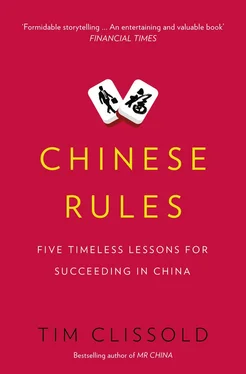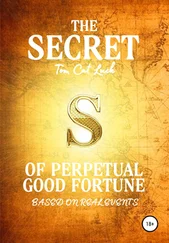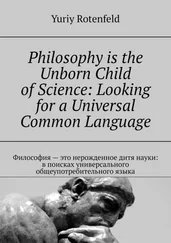Our response to the news had been catastrophic. When I tried to explain what had happened over the crackling phone lines to New York, there had been an instant, knee-jerk reaction. The directors there immediately ordered a highly sophisticated legal operation involving hordes of expensive lawyers all waving worldwide Mareva injunctions, which were aimed at freezing the bank’s assets on the basis that the branch officials must have known about the scam and that the bank was therefore liable. The case ended up in China’s Supreme Court and, after two years of pointless arguments, we lost. It was a disaster – I remembered bitterly that when the factory director had disappeared from Zhuhai, our cash was still in the account because the letters of credit had not yet been presented. One of our other Chinese factory directors had looked at me with a slightly puzzled expression and asked, ‘Why did you go to the court? You could have just transferred the cash out in small amounts without the bank noticing and when the documents arrived, they’d be left with the bill.’ We’d done the opposite; the board had metaphorically marched up to the city gates, announced a full frontal assault, and then assailed the bank with highly sophisticated legal weaponry that was completely useless for dealing with the actual problem. As soon as the bank realized what was going on, they took one look at the court papers, made a quick call to the local government, and froze all our accounts. We never recovered a cent.
Those seven years on the front lines of Chinese business taught me that foreigners had no way to impose their ideas on China from the outside; I’d learned the hard way that if you wanted to survive in China, it had to be on Chinese terms. I had been forced to think through new ideas as basic as how society, business and government could be organized and how to compete on foreign terrain. There seemed no option but to abandon some of the basic assumptions I’d brought with me from the West. I could see that China had its own modes of behaviour, its own conventions, and accepted ways of doing things that were different from our own. China’s way of working seemed difficult to pin down, but every country, every society has its own internal logic; it may not be obvious from the surface but I felt there must be some overarching rationale, some consistent narrative to how China worked. Perhaps it was something in my background that made me seek a more ordered explanation to the chaos I had found around me; perhaps it came from studying physics in university, where universal laws are used to explain diverse and seemingly unconnected observations. I found myself searching for an underpinning to the Chinese universe, reference points or clues to a larger framework that might help me navigate these foreign waters, something that might reveal how it all fitted together. China’s special logic was elusive and hard to define precisely, but I knew I’d never be satisfied if I didn’t at least make an effort to uncover it.
In the southwest of Beijing there is an area of winding alleyways around Tile Factory Street where, in the fifteenth century, ornate ceramic ornaments were fired in charcoal kilns for the rooftops of the great Ming Dynasty palaces. Three hundred years later, the area around the factory had grown into a cultural centre, where scholars, poets, and artists gathered to exchange ideas and practise calligraphy. Today the narrow streets are lined with shops piled to the roofbeams with books and scrolls; local painters come there to find paper, brushes, ink stones and seals. I often visited the bookshops, with their rickety staircases, dusty display cases, and the burnt, earthy smell of Chinese calligraphy ink. At the back of one of those bookshops, there was a room lined with battered bookcases devoted to Chinese history and ancient theories of war. I had heard about Sunzi, but had never really taken The Art of War too seriously; tales of battle plans from the sixth century BC had seemed too remote to be of much use in the modern age. But I found the shelves there lined with piles of cloth-bound books I had never heard of, like the Book of Qi and the Records of Tan Daoji . I discovered an enormous volume of historical records covering power struggles, plots, and intrigues stretching back well past the time of the European Dark Ages. At first I couldn’t understand the antiquated Chinese language, with its ancient, recondite characters, so I sought out translations, trying to put the Chinese and English together to look for the deeper meaning. I dipped into an old collection of battle plans called the Thirty-six Ruses. There I found set-piece strategies, with strange names like ‘The Beauty Trap’, ‘Take the Wood from Under a Cauldron’, and ‘Kill with Borrowed Knife’. Elsewhere, I found a Han Dynasty strategy that set out the ‘Five Baits for Enticing Foreigners’. I sensed an obliqueness in the approach that contrasted with the direct assault favoured by Westerners. I found more emphasis on timing and surprise, on harnessing external conditions rather than just relying on firepower, and on ways of deceiving a more powerful enemy. There were unexpected twists: in Sunzi’s world, the supreme general avoids war altogether and overcomes without fighting. ‘Overcomes without fighting,’ I thought. ‘What did that mean?’ I bought several of the books and found ideas that helped explain things that had happened at our factories. I was wondering whether they could all be collated into a more coherent pattern when I was suddenly contacted by some investors in Hong Kong.
At the turn of the millennium, as China prepared to join the World Trade Organization, the government realized that the banking system was crippled with uncollectible loans and they decided to do something about it. I found myself tempted by the idea of helping to clear up the mess, so I went to work for one of the big American investment banks that had just entered the new market for ‘distressed debt’ in China.
During the forty years of the planned economy, Chinese banks had given money to factories and work units under the central state plan rather than on the basis of commercial logic. Many of the borrowers had no hope – or even intention – of making repayments. The result was a mess of truly astronomical proportions, with about $700 billion worth of uncollectible debts – known as ‘nonperforming loans’ or ‘distressed debt’ – clogging up the banking system. Faced with the prospect of a complete financial meltdown, the Chinese government started restructuring the banks and selling off tranches of these nonperforming loans to foreign investors at reduced prices. The American bank had bought up several of these portfolios and I was hired to retrieve something from the wreckage.
Over the coming six months, I travelled across China visiting factories that owed amounts under these bad loans, often meeting with the local governments in charge of the area. Many of the loans had been in arrears for years and the relationship between the lender and borrower had broken down completely. Just having a new face to negotiate with often unlocked a knotty situation. At first I felt that the work could bring a lot of benefit to local communities: the factories could be released from their debts for a partial repayment; clearing out the backlog might open up the possibility of new loans; the restructuring assets could make them useful again; and management teams might get an infusion of new talent. But some of the cases were much murkier. I heard that one of the borrowers had been held under house arrest; at another, there’d been riots when a local bank had tried to seize machinery. After a while I became uneasy about the effect of some of the settlements on the local community or the individuals concerned.
Читать дальше












